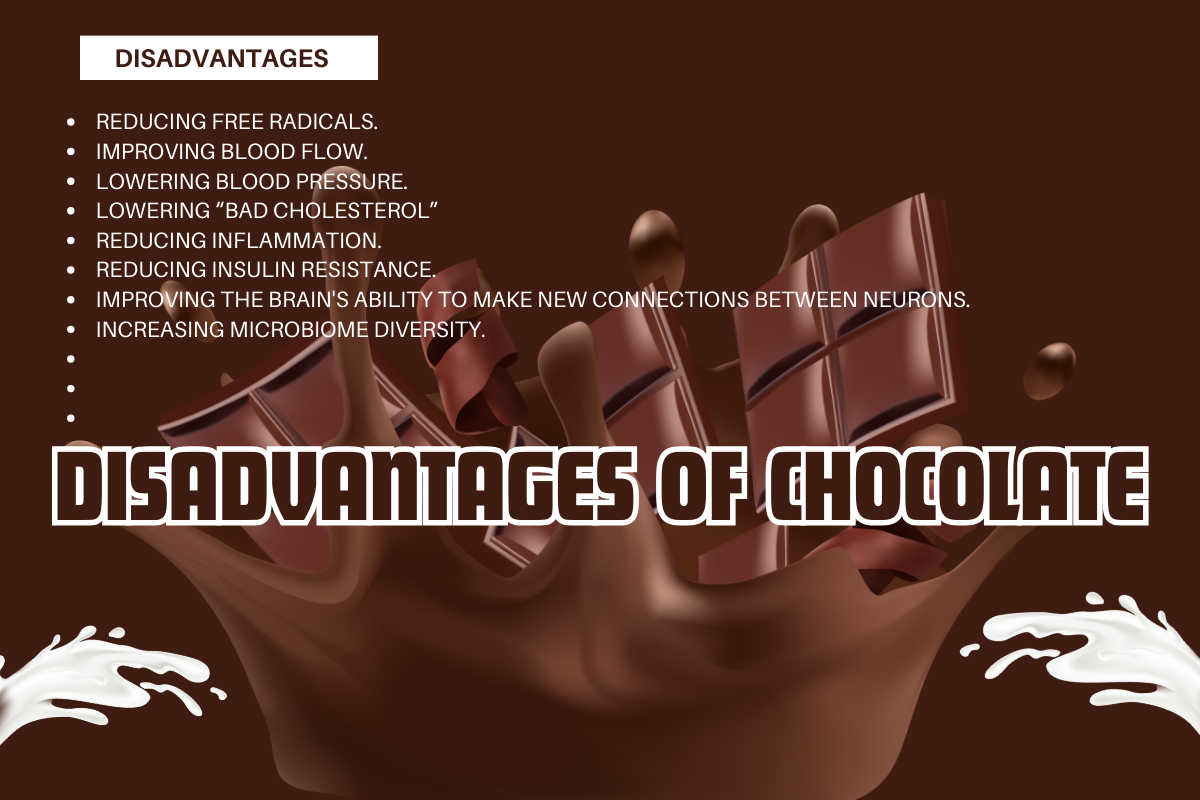Chocolate, with its sweet and pleasant taste, often brings a smile to our faces. However, indulging in this rich food can have its drawbacks. While moderation is key in consuming any food, it’s crucial to recognize that chocolate offers only a few nutritional benefits and comes with several disadvantages that may render it a poor choice for a balanced diet. The nutritional properties of chocolate can vary between brands, so it’s wise to carefully check product labels for a clearer understanding of what you’re consuming. As we explore the potential pitfalls of excessive chocolate consumption, it becomes evident that awareness and moderation are essential to maintaining a healthy lifestyle.
High Sugar Content in the Chocolate
Chocolate’s delightful and rich flavor often comes with a drawback – its high sugar content. In a standard 1.55-ounce serving or one bar, contains a substantial 22.66 grams of sugar. While sugar can provide a quick boost of energy, it also brings nutritional drawbacks, promoting issues like tooth decay. A diet high in sugar may even increase the risk of heart disease. Choosing wisely between chocolate types, with dark chocolate containing less sugar than milk chocolate, can be a mindful approach. Opting for a 70 percent dark chocolate variant, for instance, provides only 10.54 grams of sugar – less than half of what milk chocolate contains. This choice underscores the importance of balancing flavor and health considerations.
Low in Vitamins and Minerals in Chocolate
While chocolate can be a tempting treat, it has a detrimental effect on overall health when consumed as a substitute for a healthier snack. Regrettably, it offers few beneficial nutrients, making it a low source of essential vitamins and minerals. As a result, it may fall short in providing a significant source of nutrients, offering only 8 percent of the daily suggested intake of calcium and a mere 2 percent of the daily suggested intake of iron. Choosing alternatives that are rich in vital nutrients becomes imperative for a more balanced and wholesome diet.
High-Calorie Content in Chocolate
Chocolate’s allure is often challenged by its high-calorie content, making it a calorie-dense indulgence. A mere 1.55-ounce bar of milk chocolate packs in 235 calories, surpassing the count of many other snack foods. For instance, a 1.55-ounce serving of beef jerky provides just 124 calories. Consuming too many high-calorie foods can contribute to obesity, and while burning calories through exercise is an option, doing so with chocolate can be time-consuming. It would take approximately 57 minutes of weightlifting or 43 minutes of water aerobics. Even the seemingly healthier dark chocolate, with 263 calories, though containing beneficial plant compounds, still contributes to the overall calorie intake. Awareness of these factors emphasizes the importance of mindful consumption.
FAQs
Is chocolate not Good for your Health?
Eating excessive amounts of chocolate can lead to various health issues due to its high fat and sugar content. The consequences of habitual chocolate eating are far-reaching, with potential links to problems such as acne, obesity, high blood pressure, coronary artery disease, and diabetes. The presence of cocoa introduces caffeine and related chemicals, and consuming large amounts may result in caffeine-related side effects, including nervousness, increased urination, sleeplessness, and a fast heartbeat. Additionally, chocolate can be a culprit for allergic reactions on the skin, contribute to constipation, and even trigger migraine headaches. While the allure of its taste is undeniable, being mindful of the potential consequences underscores the importance of moderation in enjoying this beloved treat.
Results of Eating Chocolate Daily?
Eating chocolate every day may result in health concerns, given its bad press owing to the high fat and sugar content. Regular consumption has been associated with various issues, including acne, obesity, high blood pressure, coronary artery disease, and diabetes. The allure of daily indulgence in chocolate might need to be balanced with a mindful awareness of the potential long-term consequences on overall well-being.
Is eating Chocolate Beneficial for the Body?
Chocolate’s reputation is on the rise, supported by numerous studies suggesting it can be a heart-healthy choice. The main ingredient, cocoa, plays a pivotal role in reducing risk factors for heart disease. Loaded with beneficial flavanols, found in cocoa beans, chocolate brings about antioxidant effects that combat cell damage. While it’s essential to acknowledge the positive aspects, moderation is key, as excessive chocolate consumption might still lead to certain consequences, underscoring the importance of a balanced approach to its enjoyment for overall well-being.
What Are the Side Effects of Eating Chocolate?
The presence of cocoa in chocolate introduces elements like caffeine and related chemicals. Consuming large amounts may lead to caffeine-related side effects such as nervousness, increased urination, sleeplessness, and a fast heartbeat. Additionally, chocolate can be a potential culprit for allergic skin reactions and contribute to constipation. For some individuals, it may even trigger migraine headaches. While the delight of indulging in chocolate is undeniable, understanding these potential side effects is crucial, emphasizing the need for moderation in enjoying this treat to avoid unwanted consequences.
Can Chocolate Contribute to Weight Gain? Or does Chocolate make you fat?
Concerns about whether chocolate can make you fat stem from its high content of sugar and saturated fat. Being a high-energy, high-calorie food, excessive consumption may contribute to excess weight, which is a recognized risk factor for cardiovascular disease. While enjoying chocolate in moderation is typically fine, understanding its potential impact on weight and overall health underscores the importance of mindful indulgence.
How Much Chocolate Can I Eat a Day?
For those pondering the daily chocolate intake, experts generally recommend a modest dose of approximately 1 to 2 ounces (30-60g). While it’s okay to indulge, going beyond this recommended amount may result in consuming too many calories. As a reference, a 1.45-ounce (41-gram) Hershey’s Special Dark Chocolate Bar packs in 190 calories. To put it in perspective, this is significantly higher in calorie content when compared to a medium-sized raw apple, which provides only 95 calories. Being mindful of such comparisons aids in understanding the potential caloric impact, allowing individuals to enjoy chocolate responsibly within the recommended limits.
What is negative about chocolate?
The negative aspects of chocolate lie in its high sugar and saturated fat content. Being a high-energy, high-calorie food, excessive consumption can lead to excess weight, becoming a potential risk factor for cardiovascular disease. While chocolate provides a delightful treat, opting for alternatives like beans, pulses, fruits, and vegetables as sources of polyphenols can contribute to a healthier overall diet.
What can happen if you eat too much chocolate?
If you eat too much chocolate, it can lead to several health issues, including body weight gain, tooth decay, and an elevated risk of heart disease and type 2 diabetes. Additionally, the caffeine content in chocolate may cause sleep disturbances. It’s crucial to be mindful of chocolate consumption to avoid these potential adverse effects on health.
How does chocolate affect your health?
Moderate consumption of dark chocolate may have heart-healthy benefits due to its antioxidant properties. However, excessive intake, especially of varieties high in sugar and saturated fat, can contribute to weight gain, dental issues, and an increased risk of heart disease.
What are the non-benefits of chocolate?
Chocolate’s drawbacks include its potential to contribute to weight gain due to high sugar and saturated fat, along with the risk of dental issues and an increased risk of heart disease with excessive consumption. The caffeine content may also lead to sleep disturbances in larger quantities.
Read More About:



